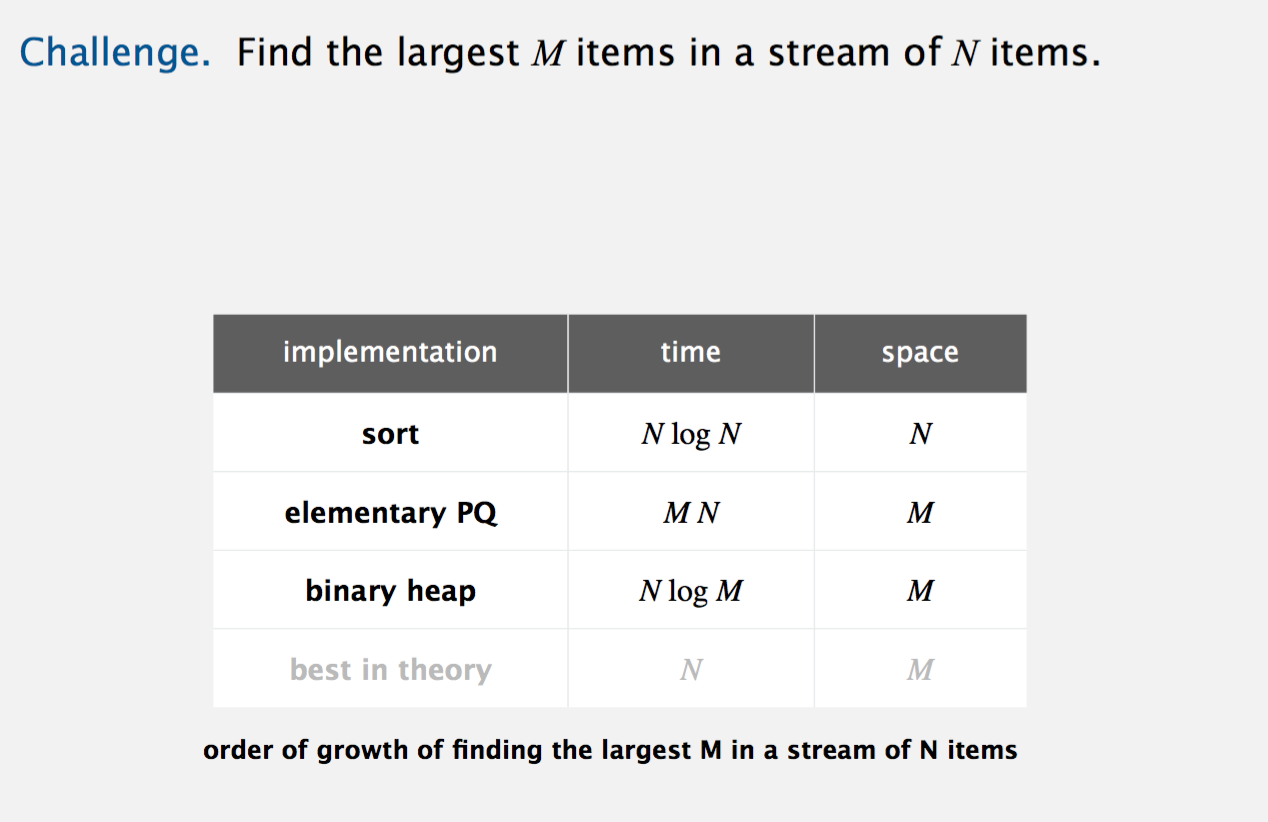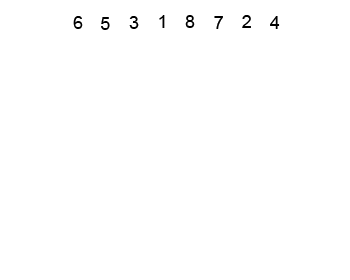Heap - 堆
一般情况下,堆通常指的是二叉堆,二叉堆是一个近似完全二叉树的数据结构,即披着二叉树羊皮的数组,故使用数组来实现较为便利。子结点的键值或索引总是小于(或者大于)它的父节点,且每个节点的左右子树又是一个二叉堆(大根堆或者小根堆)。根节点最大的堆叫做最大堆或大根堆,根节点最小的堆叫做最小堆或小根堆。常被用作实现优先队列。

注意点
- 如果更新(在maxQueue,数量增加了或者在minQueue数量减少了),一个已经在heap的数据,那么可以先把它删了,再重新把更新后的object放进去
- 要实现support find and delete by key,这个时候可以用treemap
Priority Queue
Java PriorityQueue Class Example
- PriorityQueue provides O(log(n)) time for the enqueing and dequeing methods (offer, poll, remove() and add); linear time for the remove(Object) and contains(Object) methods
import java.util.Comparator;
import java.util.PriorityQueue;
public class PriorityQueueTest {
static class PQsort implements Comparator<Integer> {
public int compare(Integer one, Integer two) {
//这是max heap
return two - one;
}
}
public static void main(String[] args) {
int[] ia = { 1, 10, 5, 3, 4, 7, 6, 9, 8 };
PriorityQueue<Integer> pq1 = new PriorityQueue<Integer>();
// use offer() method to add elements to the PriorityQueue pq1
for (int x : ia) {
pq1.offer(x);
}
System.out.println("pq1: " + pq1);
PQsort pqs = new PQsort();
PriorityQueue<Integer> pq2 = new PriorityQueue<Integer>(10, pqs);
// In this particular case, we can simply use Collections.reverseOrder()
// instead of self-defined comparator
for (int x : ia) {
pq2.offer(x);
}
System.out.println("pq2: " + pq2);
// print size
System.out.println("size: " + pq2.size());
// return highest priority element in the queue without removing it
System.out.println("peek: " + pq2.peek());
// print size
System.out.println("size: " + pq2.size());
// return highest priority element and removes it from the queue
System.out.println("poll: " + pq2.poll());
// print size
System.out.println("size: " + pq2.size());
System.out.print("pq2: " + pq2);
}
}
Output:
pq1: [1, 3, 5, 8, 4, 7, 6, 10, 9]
pq2: [10, 9, 7, 8, 3, 5, 6, 1, 4]
size: 9
peek: 10
size: 9
poll: 10
size: 8
pq2: [9, 8, 7, 4, 3, 5, 6, 1]
特点
- 以数组表示,但是以完全二叉树的方式理解。
- 唯一能够同时最优地利用空间和时间的方法——最坏情况下也能保证使用 $$2N \log N$$ 次比较和恒定的额外空间。
- 在索引从0开始的数组中:
- 父节点
i的左子节点在位置(2*i+1) - 父节点
i的右子节点在位置(2*i+2) - 子节点
i的父节点在位置floor((i-1)/2)
- 父节点
堆的操作
- pop取一个数 时间复杂度O(logn)
- push
- sift down/up
- remove某个节点 (java 自带remove 时间复杂度是O(n)), 可以通过hashheap优化到O(logn)
堆的常用方式
以大根堆为例,堆的常用操作如下。
- 最大堆调整(Max_Heapify):将堆的末端子节点作调整,使得子节点永远小于父节点
- 创建最大堆(Build_Max_Heap):将堆所有数据重新排序
- 堆排序(HeapSort):移除位在第一个数据的根节点,并做最大堆调整的递归运算
其中步骤1是给步骤2和3用的。
- 得到/删除最大值是针对已经实现了最大/最小堆说的,已经heapify了,所以针对一个元素sift sink就行
- 而heapify的时候,这个时候是乱序的,需要从底层开始不断sink,一层一层往上走(得到值后,又跟下层进行对比)

HashHeap Implementation
class HashHeap {
ArrayList<Integer> heap;
String mode;
int size_t;
HashMap<Integer, Node> hash;
class Node {
public Integer id;
public Integer num;
Node(Node now) {
id = now.id;
num = now.num;
}
Node(Integer first, Integer second) {
this.id = first;
this.num = second;
}
}
public HashHeap(String mod) { // 传入min 表示最小堆,max 表示最大堆
// TODO Auto-generated constructor stub
heap = new ArrayList<Integer>();
mode = mod;
hash = new HashMap<Integer, Node>();
size_t = 0;
}
int peak() {
return heap.get(0);
}
int size() {
return size_t;
}
Boolean empty() {
return (heap.size() == 0);
}
int parent(int id) {
if (id == 0) {
return -1;
}
return (id - 1) / 2;
}
int lson(int id) {
return id * 2 + 1;
}
int rson(int id) {
return id * 2 + 2;
}
boolean comparesmall(int a, int b) {
if (a <= b) {
if (mode == "min")
return true;
else
return false;
} else {
if (mode == "min")
return false;
else
return true;
}
}
void swap(int idA, int idB) {
int valA = heap.get(idA);
int valB = heap.get(idB);
int numA = hash.get(valA).num;
int numB = hash.get(valB).num;
hash.put(valB, new Node(idA, numB));
hash.put(valA, new Node(idB, numA));
heap.set(idA, valB);
heap.set(idB, valA);
}
Integer poll() {
size_t--;
Integer now = heap.get(0);
Node hashnow = hash.get(now);
if (hashnow.num == 1) {
swap(0, heap.size() - 1);
hash.remove(now);
heap.remove(heap.size() - 1);
if (heap.size() > 0) {
siftdown(0);
}
} else {
hash.put(now, new Node(0, hashnow.num - 1));
}
return now;
}
void add(int now) {
size_t++;
if (hash.containsKey(now)) {
Node hashnow = hash.get(now);
hash.put(now, new Node(hashnow.id, hashnow.num + 1));
} else {
heap.add(now);
hash.put(now, new Node(heap.size() - 1, 1));
}
siftup(heap.size() - 1);
}
void delete(int now) {
size_t--;
Node hashnow = hash.get(now);
int id = hashnow.id;
int num = hashnow.num;
if (hashnow.num == 1) {
swap(id, heap.size() - 1);
hash.remove(now);
heap.remove(heap.size() - 1);
if (heap.size() > id) {
siftup(id);
siftdown(id);
}
} else {
hash.put(now, new Node(id, num - 1));
}
}
void siftup(int id) {
while (parent(id) > -1) {
int parentId = parent(id);
if (comparesmall(heap.get(parentId), heap.get(id)) == true) {
break;
} else {
swap(id, parentId);
}
id = parentId;
}
}
void siftdown(int id) {
while (lson(id) < heap.size()) {
int leftId = lson(id);
int rightId = rson(id);
int son;
if (rightId >= heap.size() || (comparesmall(heap.get(leftId), heap.get(rightId)) == true)) {
son = leftId;
} else {
son = rightId;
}
if (comparesmall(heap.get(id), heap.get(son)) == true) {
break;
} else {
swap(id, son);
}
id = son;
}
}
}